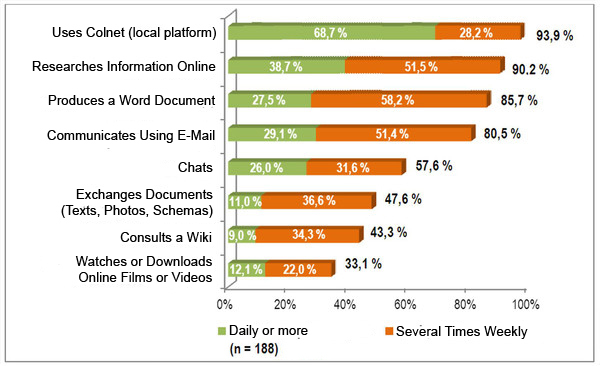An exploratory study of students and faculty at Cégep de Jonquière conducted in Spring 2011 reveals that information technology and communication (ICT) and new media are important resources for learning in college. These techno-pedagogical tools, however, present numerous pedagogical challenges. The study’s approach was to first document the equipment, student use and access to ICT and social media and, to second identify student and teacher perceptions of ICT’s academic usefulness at college. Internet questionnaires returned data from a representative sample of students in their second year and beyond at Cégep de Jonquière. The data was compiled by gender and discipline grouping. Additionally, a series of group interviews were conducted with students and teachers from various programs at the college.
The results show that college students are very well equipped in terms of ICT with almost three quarters of respondents owning a laptop and one in five a smartphone. A high proportion of the young people consulted, 92.8% precisely, connect to the web once or more daily.

The Proportion of College Students Undertaking Various ICT-related Academic Activities Several Times Weekly or More
In interviews, students reported particularly appreciating the fact that the Internet allows them to quickly access the latest information. Some even wondered how previous generations were able to do their homework without these technological tools!
Across the board, both students and teachers consider that ICT is a valuable tool to support learning and communicating. Despite the undeniable advantages of these tools, however, many teachers experience difficulties dealing with some of their effects such as easy plagiarism, students distracted by Facebook and their phones in class and the resulting significant loss of time. During the meetings, teachers underlined that ICT use also presents many pedagogical challenges such as the increased workload of continuing education to remain up-to-date, numerous student e-mails seeking rapid responses and frequent equipment updates. While noting that many students dealt well with the commonplace use of ICT, teachers consulted noted that more than a few of their students find themselves unable to select relevant information and assess its credibility. Academic monitoring and follow-up therefore appear essential to foster effective learning.
While virtually all students have adopted Facebook, which is now one of the most favoured modes of communication by young people, this social media is not well known among teachers and creates distrust. Overall, teachers’ unfamiliarity with social media engenders its limited use in college. Many also question the ethical aspects of using Facebook academically.
In the coming years, we should expect that ICT and new media will experience increasing use by students and teachers at college. It is particularly important to educate teachers on how students use technology to better profit from its use in courses. Do the findings from the study at Cégep de Jonquière correspond to the reality that you have observed in your establishment?
The report is available online in French at the site of ÉCOBES Recherche et transfert. Read about a similar report in a recent Profweb column.

